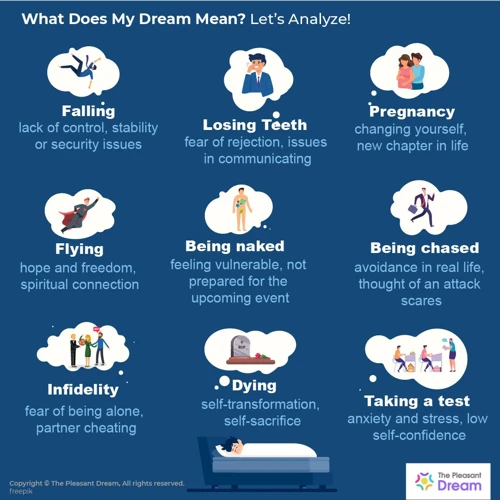Have you ever had a dream where you found yourself unable to move or escape from a situation? It can be a disconcerting and perplexing experience, leaving you feeling vulnerable and powerless. This phenomenon has led many to explore the meaning behind dreams of immobility and the emotions they may represent. In this article, we will delve into the various causes of not being able to move in dreams, common dream scenarios, the symbolism behind these dreams, and provide tips for dealing with them. So, if you’re ready to unlock the secrets of your dreams and gain a deeper understanding of yourself, read on!
Causes of Not Being Able to Move in Dreams

One of the reasons for experiencing the sensation of not being able to move in dreams is a phenomenon called sleep paralysis. During sleep paralysis, the body remains temporarily immobile while the mind is awake, creating a sense of helplessness and confinement. This occurrence can be accompanied by hallucinations and a feeling of pressure on the chest, making it even more alarming. Another possible cause is lucid dreaming, a state where you are aware that you are dreaming but still unable to exert control over your movements. This can lead to a sense of frustration and powerlessness as you struggle to break free from the dream’s constraints. Additionally, unresolved emotional stress, such as trauma or anxiety, can manifest in dreams as a lack of mobility, reflecting the deep-seated emotions that we may struggle to confront and overcome during waking life. Feelings of anxiety and fear can result in dreams where we are unable to move, mirroring our subconscious worries and insecurities. Physical stress and exhaustion can also contribute to dreams of immobility, as our bodies and minds seek rest and restoration in the dream state. Lastly, dreams of being unable to move can also have symbolic representation, reflecting a sense of powerlessness, entrapment, or being held back in some aspect of our lives. So, the causes of not being able to move in dreams are multifaceted, intertwined with both psychological and physical factors, each contributing to the perplexing experience.
Sleep Paralysis
Sleep paralysis is a fascinating and perplexing phenomenon that can contribute to the experience of not being able to move in dreams. During sleep paralysis, the body temporarily loses its ability to move while the mind remains awake, resulting in a state of partial or total paralysis. This can be accompanied by vivid hallucinations, making it even more unsettling. The feeling of being trapped and unable to escape in a dream can be linked to the physical immobility experienced during sleep paralysis. It is believed to occur due to a disruption in the transition between sleep stages, particularly during rapid eye movement (REM) sleep. While sleep paralysis is a natural process that typically lasts for a few moments to a few minutes, it can be an unsettling and terrifying experience for those who go through it. If you want to learn more about sleep paralysis, you can read our article on the phenomenon of going back in time in dreams.
Lucid Dreaming
– Lucid dreaming is a fascinating phenomenon where individuals become aware that they are dreaming while still in the dream state. This heightened state of consciousness can often lead to a feeling of control and agency within the dream. However, paradoxically, some individuals experience being unable to move despite their lucidity. This can be frustrating and confusing, as lucid dreaming is often associated with the ability to manipulate and navigate the dream environment. The lack of mobility may stem from various factors such as the individual’s level of lucidity or their subconscious fears and anxieties manifesting as immobility in the dream. In some cases, it may be a sign that the individual is not fully embracing or integrating their lucid dreaming abilities. Exploring and understanding the nuances of lucid dreaming and its relationship to the experience of being immobilized can provide valuable insights into the realm of dream consciousness.
Unresolved Emotional Stress
– Unresolved Emotional Stress: Dreams of being unable to move can often be linked to unresolved emotional stress in our lives. These dreams serve as a reflection of the deep-seated emotions that we may struggle to confront and overcome during waking life. It is not uncommon for past traumas, anxieties, or unresolved conflicts to manifest in our dreams, creating a sense of helplessness and immobility. These dreams may serve as a reminder that there are underlying emotional issues that need to be addressed and resolved. Whether it’s the fear of confrontation, the pain of a past relationship, or the anxiety of an uncertain future, our dreams can shine a light on the emotional baggage we carry. Taking the time to explore these emotions and seek resolution can ultimately lead to a sense of freedom and empowerment. (Internal link: Dream of Theft)
Anxiety and Fear
Dreams of not being able to move can often be linked to anxiety and fear. These emotions can manifest in dreams as a sense of being trapped or unable to escape a threatening situation. It may reflect our subconscious worries and insecurities that we may struggle to confront and overcome while awake. This dream scenario may also be related to the fear of failure or the fear of losing control in our waking lives. The feeling of helplessness in the face of anxiety and fear becomes magnified in our dreams, leaving us with a palpable sense of powerlessness and vulnerability. Understanding and addressing these underlying emotions can help us find ways to cope and gain a sense of control over our fears and anxieties in both our dream world and waking life.
Physical Stress and Exhaustion
Physical stress and exhaustion can contribute to dreams of immobility. When our bodies and minds are weary, our dreams may reflect our need for rest and rejuvenation. The pressures of daily life, work, and other responsibilities can weigh heavily on us, leading to physical exhaustion. This exhaustion can manifest in our dreams, causing us to feel sluggish, lethargic, and unable to move freely. Our bodies’ desire for rest is echoed in the dream state, where our lack of mobility may symbolize the need to prioritize self-care and recharge our energy levels. It is essential to acknowledge the impact of physical stress and exhaustion on our dreams and take the necessary steps to achieve a better balance in our waking lives.
Symbolic Representation
Dreams of not being able to move can often have a symbolic representation in relation to our waking lives. Being immobile in a dream can signify a sense of powerlessness or being trapped in a particular situation. It may reflect a lack of control or agency in our daily lives, where we feel limited or constrained by external factors. This symbolism can be interpreted as a message from the subconscious, urging us to examine areas where we may feel stuck or stagnant and seek opportunities for growth and change. Exploring these symbolic representations can provide valuable insights into our emotions, desires, and the need for self-empowerment. So, dreams of immobility serve as a reminder to reflect upon our current circumstances and strive for personal liberation and progression in pursuit of a more fulfilling life.
Common Dream Scenarios

Dreams of immobility can manifest in a variety of scenarios, each with its own unique symbolism and emotional impact. One common dream scenario is being frozen in place, where you find yourself unable to move or speak, as if rooted to the spot. This can symbolize feelings of being trapped or stuck in a situation, unable to make progress or take action. Another scenario involves the frustration of being unable to run or escape, where you may find yourself desperately trying to flee from a threat but your legs feel heavy or unresponsive. This dream can reflect a sense of helplessness or being overwhelmed by challenges in your waking life. Alternatively, dreaming of being immobile underwater can evoke a feeling of suffocation or being weighed down by emotional burdens. The sensation of being trapped or bound, such as being tied up or locked in a room, represents a sense of confinement or restriction in some aspect of your life. In some cases, dreams of immobility may be accompanied by the presence of an unseen force or entity, paralyzing you with fear and intensifying the feelings of powerlessness. Lastly, dream scenarios where you are restrained by invisible restraints can symbolize the limitations or self-imposed barriers holding you back from achieving your goals. These common dream scenarios offer valuable insights into the emotions and struggles you may be facing in your waking life.
Frozen in Place
Dreams of being frozen in place are commonly reported by individuals, and they can evoke a sense of being trapped or immobilized. This dream scenario often occurs when one feels overwhelmed or stuck in a particular situation in waking life. It may reflect a fear of change or an inability to take action, leading to a feeling of powerlessness. In such dreams, individuals may try desperately to move but find themselves rooted, unable to break free from the constraint. It can be a disconcerting experience, as the frustration of being immobile conflicts with the desire for movement and progress. The symbolism behind being frozen in place may vary for each individual, but it often highlights a sense of being held back or restrained in some way. It is crucial to explore the underlying emotions and contexts to gain a deeper understanding of the implications of dreams in which you find yourself unable to move.
Unable to Run or Escape
Dreaming of being unable to run or escape presents a particularly distressing scenario. In these dreams, individuals often find themselves trapped in a dangerous or threatening situation, desperately trying to flee but unable to move their legs, as if weighed down by an invisible force. This can evoke feelings of panic, vulnerability, and frustration, amplifying the sense of powerlessness experienced within the dream. The inability to run or escape in dreams may symbolize a fear of confrontation, difficulty facing challenges, or a sense of being trapped in undesirable circumstances. It can also reflect underlying anxieties about not being able to control or avoid certain aspects of life. These dreams serve as powerful reminders to confront and overcome our fears and find ways to regain a sense of control and empowerment.(source)
Immobile Underwater
Dreaming of being immobile underwater can evoke a sense of suffocation and helplessness. In these dreams, individuals may find themselves submerged in water, unable to swim or move their limbs. This scenario can signify feelings of being overwhelmed emotionally or being in a situation where one’s actions or decisions are constrained. It may also represent a fear of being submerged in deep emotions or being unable to express oneself freely. The dreamer may experience a sense of urgency and panic while longing to break free from the constraints of the water. These dreams often highlight the need to address emotional challenges and find ways to navigate difficult situations in waking life.
Trapped or Bound
Dreams of being trapped or bound are another common scenario that can leave us with a sense of helplessness and confinement. In these dreams, we may find ourselves physically restrained by ropes, chains, or other means, making it impossible to escape or move freely. The feeling of being trapped in these dreams can symbolize a broader sense of being trapped or limited in our waking lives. It may represent situations where we feel stuck, controlled, or unable to break free from certain circumstances or relationships. These dreams can evoke intense emotions of frustration, desperation, and a yearning for liberation. They serve as a reminder to explore areas in our lives where we may need to assert our independence, make changes, or break free from unhealthy patterns that hold us back.
Paralyzed by a Presence
A common dream scenario related to the topic of being unable to move in dreams is being paralyzed by a presence. In these dreams, individuals often find themselves frozen and unable to move or speak due to the overwhelming presence of someone or something in the dream. The presence may be menacing, mysterious, or even supernatural in nature, intensifying the feeling of helplessness and fear. This type of dream can be associated with feelings of being controlled or manipulated by outside forces in waking life, and may indicate a need to assert oneself and regain a sense of personal power and autonomy. It is important to explore the underlying emotions and symbolism behind these dreams to gain a deeper understanding of their significance in one’s life.
Invisible Restraints
Dreams of invisible restraints can be particularly unsettling. In these dreams, individuals feel as though they are bound or restrained, but there are no visible restraints present. This can create a deep sense of confinement and powerlessness, as the inability to see or identify the source of the restraint amplifies the feeling of being trapped. The invisible nature of the restraints may symbolize deeply ingrained emotional or psychological barriers that are holding the dreamer back from achieving their goals or realizing their full potential. It can also represent feelings of being controlled or manipulated by unseen forces in waking life. These dreams of invisible restraints serve as a reminder to identify and confront the hidden obstacles that may be hindering personal growth and liberation.
Interpretation and Symbolism

Dreams where we are unable to move hold deep interpretations and symbolism that can provide insight into our subconscious thoughts and emotions. Firstly, the feeling of powerlessness and lack of control experienced in these dreams often mirrors our waking life struggles. It signifies situations where we may feel trapped, overwhelmed, or unable to make progress. Secondly, dreams of immobility often carry a strong message of anxiety and insecurity. They may indicate underlying fears about our abilities, relationships, or future prospects. These dreams serve as reminders to address and confront these anxieties in order to regain a sense of empowerment. Additionally, dreams of being unable to move can be a symbol of feeling stuck in life or being held back from reaching our goals. They highlight the need to break free from self-imposed limitations or external obstacles to embrace personal growth. Dreams of immobility may signify suppressed emotions and desires that we have ignored or failed to express. They serve as a wake-up call to acknowledge and process these emotions for our overall well-being. Lastly, dreams where we are unable to move may reflect a lack of confidence or self-efficacy. They remind us to cultivate self-belief and take action towards achieving our aspirations. The interpretations and symbolism of dreams of immobility are complex and subjective, requiring personal reflection and introspection to fully grasp their significance.
Powerlessness and Lack of Control
– Powerlessness and
Subscribe to Our Newsletter
Sign up to receive the latest news and updates.
– These dreams may signify a feeling of being trapped or bound in a particular situation, unable to break free or make progress.
– They can also indicate a lack of control over one’s own actions or decisions, highlighting a perceived power imbalance in waking life.
– Dreams of immobility can serve as a reminder to examine areas in life where one may feel disempowered or lacking agency.
– It is important to explore these feelings and consider ways to regain a sense of control and empowerment in order to address any underlying issues.
Anxiety and Insecurity
– Dreams of immobility can often reflect deep-seated anxiety and insecurity.
– The inability to move in these dreams may symbolize a lack of control or a fear of making the wrong decisions in waking life.
– These dreams may highlight underlying fears or uncertainties that we may be grappling with.
– The feeling of being trapped or restrained in these dreams can represent the anxieties and insecurities that hold us back from taking action or pursuing our goals.
– Exploring and addressing these emotions can help us gain a better understanding of ourselves and work towards overcoming our anxieties and insecurities.
Sign of Feeling Stuck in Life
Feeling unable to move in dreams can be a sign of feeling stuck in life. It may reflect a sense of being trapped or unable to make progress in certain areas. This dream scenario often arises when we are facing obstacles or challenges in our waking lives that make us feel powerless or uncertain about our ability to move forward. It serves as a symbolic representation of the emotional and psychological barriers that may be holding us back from reaching our goals and pursuing our aspirations. By acknowledging and exploring this symbolism, we can gain insight into the areas where we feel stuck and take steps towards finding solutions and making positive changes.
Suppressed Emotions and Desires
Dreams of not being able to move can also be linked to suppressed emotions and desires. Sometimes, our dreams serve as a way for our subconscious minds to bring unresolved emotions to the surface. When we suppress our feelings or ignore our deepest desires in our waking life, they can manifest in our dreams as a sense of immobility. These dreams may be a reflection of the internal conflict we are experiencing, as our subconscious attempts to communicate the need to address and process these emotions. It is important to pay attention to the emotions that arise during these dreams and explore ways to express and release them in our waking life. By acknowledging and addressing our suppressed emotions and desires, we can gain a deeper understanding of ourselves and work towards achieving emotional growth and fulfillment.
Lack of Confidence or Self-Efficacy
– Doubting one’s abilities or feeling inadequate can manifest in dreams as the inability to move, symbolizing a lack of confidence or self-efficacy.
– Dreams of immobility can serve as a reflection of one’s self-perceived limitations and fears of failure.
– These dreams may highlight the need to work on building self-confidence and belief in one’s own abilities.
– Addressing underlying insecurities and challenging negative self-perceptions can help overcome the recurring theme of immobility in dreams.
Tips for Dealing with Dreams of Immobility
Dealing with dreams of immobility can be unsettling, but there are strategies you can employ to navigate through these experiences. Practice Dream Awareness by keeping a dream journal and exploring the emotions and symbols present in your dreams. This can help you gain insights into the underlying meaning behind your immobility dreams. Focus on Self-Empowerment by visualizing yourself breaking free from the constraints of the dream. Affirmations and positive imagery can help empower you and cultivate a sense of control. Explore the Underlying Emotions that may be causing these dreams. Journaling, therapy, or self-reflection can help you address and process any unresolved emotions or stressors. Engage in Stress-Reduction Techniques such as meditation, deep breathing exercises, or gentle physical activity to promote relaxation and reduce anxiety. And remember, if these dreams persist or significantly impact your well-being, don’t hesitate to Seek Professional Help if Necessary. A therapist or dream expert can provide guidance and assist you in understanding and coping with these dreams more effectively. By implementing these tips, you can navigate the realm of dream immobility with a sense of empowerment and clarity.
Practice Dream Awareness
– Keep a dream journal by your bed to record your dreams as soon as you wake up. This will help you become more aware of your dream patterns and themes.
– Train yourself to recognize dream signs and reality checks. Throughout the day, ask yourself if you are dreaming. This habit will carry over into your dreams and increase your chances of becoming aware within them.
– Set intentions before sleep to become lucid in your dreams. Visualize yourself realizing you are dreaming and taking control of the dream.
– Practice meditation and mindfulness in your waking life. This will enhance your overall awareness and may carry over into your dream state.
– Experiment with techniques such as reality testing or the Wake-Back-to-Bed method, which involves waking up in the middle of the night and then returning to sleep with the intention of entering a lucid dream.
Focus on Self-Empowerment
To overcome dreams of immobility, it is crucial to focus on self-empowerment. Recognize that dreams are often reflections of our subconscious thoughts and emotions. By acknowledging the symbolism and messages behind these dreams, we can take steps towards gaining control over our waking lives. Engage in practices that boost self-confidence and assertiveness, such as positive affirmations, visualizations, and setting achievable goals. Surround yourself with supportive individuals who encourage and uplift you. Remember that you have the power to shape your reality and overcome any obstacles that may come your way. Embrace your inner strength and believe in your ability to take charge of your life. By cultivating self-empowerment, you can transform dreams of immobility into opportunities for growth and personal development.
Explore the Underlying Emotions
Exploring the underlying emotions associated with dreams of immobility is crucial for gaining insight into their meaning. It is essential to take the time to reflect on the emotions experienced during and after the dream. Keeping a dream journal can help track recurring themes or patterns in these dreams. Identify any negative or repressed emotions that may be surfacing, such as fear, insecurity, or powerlessness. Consider how these emotions may relate to your waking life and any unresolved issues or conflicts. Engage in introspection and self-reflection to gain a deeper understanding of these emotions, their origins, and potential ways to address them. Seek support from a therapist or counselor if needed, as they can provide guidance and help in processing and resolving these underlying emotions.
Engage in Stress-Reduction Techniques
Engaging in stress-reduction techniques can be incredibly beneficial when it comes to dealing with dreams of immobility. Stress-reduction techniques help to calm the mind, relax the body, and promote a sense of overall well-being. Some effective techniques to consider include:
- Meditation: Practicing mindfulness meditation can help reduce stress and increase self-awareness, allowing you to better navigate and understand your dreams.
- Deep breathing exercises: Deep breathing exercises help activate the body’s relaxation response, counteracting the effects of stress and promoting a sense of calmness.
- Physical exercise: Engaging in regular physical exercise, such as yoga or jogging, can help reduce stress levels, improve sleep quality, and promote a more positive mindset.
- Journaling: Keeping a dream journal can provide a valuable outlet for processing and reflecting on your dreams, allowing you to better understand any underlying emotions or patterns.
- Progressive muscle relaxation: This technique involves tensing and then relaxing different muscle groups in the body, promoting a deep state of relaxation and reducing stress levels.
- Aromatherapy: Using calming scents, such as lavender or chamomile, can help create a soothing environment before bed and promote relaxation.
By actively engaging in stress-reduction techniques, you can help create a more serene and balanced mindset, potentially reducing the occurrence of dreams of immobility and enhancing your overall dream experience.
Seek Professional Help if Necessary
If you find that dreams of immobility are causing significant distress or interfering with your daily life, it may be beneficial to seek professional help. A qualified therapist or counselor can provide support and guidance in exploring the underlying emotions and experiences that may be contributing to these dreams. They can help you develop coping strategies and techniques to manage anxiety or stress, and assist in addressing any unresolved issues that may be manifesting in your dreams. Remember, it is important to prioritize your mental and emotional well-being, and seeking professional help can be a valuable step towards understanding and resolving these dream experiences.
Conclusion
In conclusion, dreams of not being able to move can be unsettling and leave us feeling vulnerable and powerless. However, by exploring the causes behind these dreams, understanding the common scenarios, interpreting the symbolic meanings, and implementing tips to deal with them, we can gain valuable insights into ourselves and our emotions. Whether it be sleep paralysis, unresolved stress, or symbolic representations, these dreams provide an opportunity for self-reflection and personal growth. Remember, if these dreams persist or cause significant distress, seeking professional help can be beneficial in understanding and addressing any underlying issues. By embracing the messages and emotions that dreams of immobility convey, we can navigate our waking lives with greater self-awareness and empowerment. So, unlock the mysteries of your dreams and embark on a journey of self-discovery.
Frequently Asked Questions
1. Why do I sometimes dream of not being able to move?
Dreams of not being able to move can have various causes. It could be due to sleep paralysis, lucid dreaming, unresolved emotional stress, anxiety, physical exhaustion, or symbolic representation of powerlessness.
2. Is not being able to move in dreams a common experience?
Yes, it is relatively common for people to have dreams where they feel immobilized or unable to move. It can be a disconcerting and perplexing experience for many.
3. Can dreams of immobility be related to sleep disorders?
Dreams of immobility, particularly in the form of sleep paralysis, can be associated with sleep disorders like narcolepsy or episodes of sleep apnea. However, occasional experiences of being unable to move in dreams are not necessarily indicative of a sleep disorder.
4. Are dreams of immobility always negative or scary?
No, dreams of immobility can vary in their emotional tone. While they can be unsettling or even frightening, they can also serve as metaphors for feeling stuck or unable to progress in a certain area of life.
5. Can dreams of not being able to move be interpreted as a precursor to real-life events?
Dreams do not typically predict literal events, but they can reflect our subconscious thoughts, emotions, and fears. Dreams of immobility may reveal underlying feelings of powerlessness that we need to address or take action on in our waking lives.
6. How can dreams of immobility be linked to unresolved emotional stress?
Dreams often serve as a way for our minds to process and make sense of unresolved emotions. Dreams of not being able to move can be connected to unresolved emotional stress as it symbolizes the feeling of being emotionally or psychologically trapped.
7. Are there any cultural or spiritual interpretations of dreams about immobility?
Yes, different cultures and spiritual traditions may have their own interpretations of dreams about immobility. For example, some believe that such dreams indicate the presence of negative or malevolent entities, while others view it as a sign of personal growth or transformation.
8. Can recurrent dreams of immobility have any specific meanings?
Recurrent dreams of not being able to move may suggest that certain issues or emotions in your life are persistently unresolved or need your attention. It is worth exploring these recurring dreams to gain insight into areas where you may feel stuck.
9. Are there any techniques to overcome the feeling of not being able to move in dreams?
Yes, techniques such as practicing dream awareness, focusing on self-empowerment, exploring underlying emotions, engaging in stress-reduction techniques, and even seeking professional help can be helpful in dealing with dreams of immobility.
10. Should I be concerned if I frequently have dreams of not being able to move?
If your dreams of immobility are causing significant distress or impacting your daily life, it may be beneficial to speak with a therapist or sleep specialist. They can help determine any underlying issues and provide guidance on how to address them effectively.










